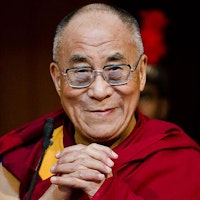Both from the point of view of peace in the world and to foster the beneficial potential of religion in the world, the faith traditions must find a way of relating to each other with mutual acceptance and genuine respect.
Both from the point of view of peace in the world and to foster the beneficial potential of religion in the world, the faith traditions must find a way of relating to each other with mutual acceptance and genuine respect.
The Dalai Lama

With Mutual Acceptance and Respect
Topic: Interfaith Pathways
“Despite the tremendous progress in material conditions the world over, suffering remains. The afflictions such as greed, anger, hatred, and envy that underpinned much of our misery thousands of years ago continue to do so even today. Unless there is a radical change in human nature within a rapid period of time, these afflictions will plague us for many centuries to come. The teachings of each of the world’s great religions, in their own unique way, have been and will continue to be a spiritual resource to counter the effects of these afflictions. Therefore, religion remains relevant and will have an important role in human society for the foreseeable future. Supremely, the religions have inspired the flow of compassion and great acts of altruism, the effects of which have resonated in the lives of millions. So, both from the point of view of peace in the world and to foster the beneficial potential of religion in the world, the faith traditions must find a way of relating to each other with mutual acceptance and genuine respect.“
Tenzin Gyatso, born on July 6, 1935, is known globally as the 14th Dalai Lama, the spiritual and former political leader of the Tibetan people. Born as Lhamo Thondup in a farming family in Taktser, Amdo, Tibet, he was recognized as the reincarnation of the 13th Dalai Lama, Thubten Gyatso, when he was just two years old. As the Dalai Lama, he holds the highest spiritual position within Tibetan Buddhism and is seen as a figure of great moral authority and influence. Following China's invasion of Tibet in 1950, he assumed full political power in 1950 but was forced into exile in India in 1959 after the failed Tibetan uprising against Chinese rule.
The Dalai Lama is renowned for his messages of peace, non-violence, inter-religious understanding, and compassion. He has authored numerous books and has lectured worldwide, becoming one of the most influential figures in the world of spirituality and philosophy. In recognition of his work for peace and non-violence, he was awarded the Nobel Peace Prize in 1989. Furthermore, his advocacy for the cultural and religious rights of the Tibetan people and his efforts to find a peaceful solution to the situation in Tibet through dialogue and understanding, rather than violence, have made him an internationally respected leader. Despite the political controversies and challenges, he remains committed to promoting human values and harmony among the world's religious traditions.
Toward a True Kinship of Faiths
The Dalai Lama. Toward a True Kinship of Faiths: How the World's Religions Can Come Together. Doubleday Religion, 2010, p. XI [Preface].

The Dalai Lama
Copyright © 2017 – 2026 LuminaryQuotes.com About Us

Additional Dalai Lama Quotes
“Make the vow today that you shall never allow your faith to be used as an instrument of violence. Make the vow today that you may become an instrument of peace, living according to the ethical teachings of compassion in your own religion.”
–The Dalai Lama [Toward A True Kinship of Faiths].